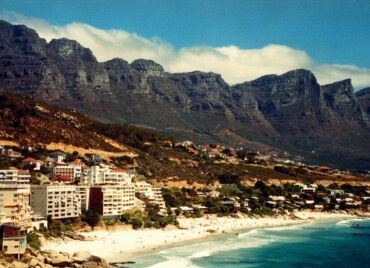 The Twelve Apostles
The Twelve Apostles
from Clifton Beach, Cape Town,
South Africa
|
|
Sentried at the southern tip of the African continent, Cape Town
(the legislative capital of
South Africa
cuts the same splendid vistas today with Devil's Peak, Table
Mountain, the Twelve Apostles, and Lion's Head mesmerizing the
majestic skyline as took the breaths away from the first
seventeenth century ocean explorers (Vasco Da Gama, Jan van
Riebeeck et al) to these parts. This is one of the richest
countries in the world, producing seventy percent or more of all
its diamonds, gold, platinum, and uranium. The internationally
renowned Kruger National Park, Hluhluwe Game Reserve, and Okavango
Swamps provide wild life refuges and sanctuaries on a par with
none. Then when you additionally throw in
the finest surfing
waves
on
our planet,
you realize when continents and countries were formed and gifts and
riches were handed out,
South Africa
was at the front of the line.
So whenever I confront the way it is as distinct from
the way I'd like it to be or even as distinct from the
way it should be,
South Africa
presents the quintessential
paradox,
which is this: in the midst of plenty, in the midst of
staggering breathtaking beauty, why is life still a
struggle here? It's been years since apartheid ended. That for
sure is a massive shift, not to mention a
miraculous
shift, a once considered impossible shift. Now its
peoples are dealing with the new realities of life in a fledgeling
capitalist democracy. And the unarticulated question on everyone's
lips is "Why isn't freedom
free?".
The United States has dealt with this very issue for decades. We
call it "The American Dream". We've an image of what life
could be, of what life should be. For
years, immigrants (legal and otherwise) have flocked to America in
droves in search of it. To be sure, there's tangible evidence of a
relatively small percentage of men and women, self made, realizing
the American Dream. Yet most go looking for America but don't
find it anywhere (as Columbia Pictures' original Easy
Rider poster may have said).
That's always interested me. No, not negating the American Dream.
I
God
Bless every day I'm
privileged
to live in the United States free to pursue and to live the
American Dream. I'm referring to the people who, while aspiring to
the American Dream or to whatever they consider the American
Dream to be "don't find it anywhere". When we don't find
it, what does that tell us? I assert it tells us less about America
than it tells us about something even more pertinent: the stock we
place in our expectations, hopes, and dreams.
So it is in
South Africa.
Do peoples' expectations of life as it is today, even in the
aftermath of the once impossible to vanquish
apartheid, tell us anything about
South Africa?
Or,
congruent with life
in the United States, do they tell us something even more pertinent
about our hopes and dreams, the same thing about people's hopes and
dreams in any country anywhere on
Earth?
Werner
Erhard
says
"Life is a ripoff when
you expect to get what you want. Life works when you choose what
you got. Actually what you got is what you chose. To move on,
choose it.".
Life in
South Africa,
like life in the United States of America, doesn't make the
expected results of the dream available to everyone
free of charge just because they're expected. Actually it's
worse than that.
South Africa,
like life in the United States of America, can't make
the expected results of the dream available to everyone free of
charge. But there's a key distinction. In the United States we're
aware if you want it, it's pure naïveté to
expect you'll get it just because you want it. However, you
can have it if you invent it as a possibility then
enroll others in your having gotten it. In
South Africa,
there's a sincerely charming, unripe, immature undercurrent of
expectation which sounds something like this:
We didn't have it during the apartheid years. Now that
apartheid's over, we want it, we want it all, and we want it
now.
|